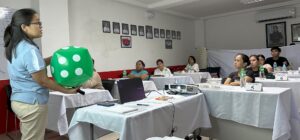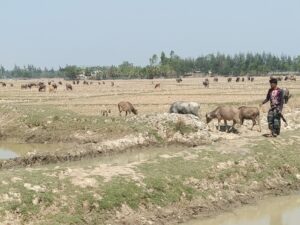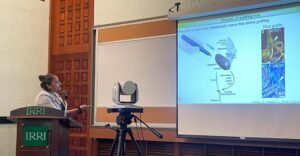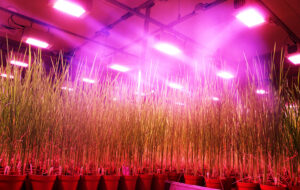by Maria Rowena M. Baltazar
Targeted research and robust seed delivery systems for Bangladesh and Nepal were the objectives for STRASA Phase 3 Year 2, as the project held its annual planning and review of Year 1 in Kathmandu, Nepal, on 17 September 2015.
About 120 participants from India, Bangladesh, Nepal, Cambodia, and the Philippines discussed how the development of multi-stress-tolerant rice varieties (STRVs) can be accelerated and their seeds multiplied and disseminated by multiple partners in the seed sector in Bangladesh, India, and Nepal.
“IRRI has already contributed about 50% to rice variety development in Nepal and I’m very happy about how the STRASA project is boosting our efforts to produce more rice in the country,” Dr. Chet Raj Upreti, executive director of the Nepal Agricultural Research Council (NARC), said during the inaugural program.
Dr. Md. Hemayet Hussain, Joint Secretary of the Ministry of Agriculture of Bangladesh, gave the opening remarks. “It is with great pleasure that the STRASA Project, coordinated by IRRI, has been helping our farmers, especially in less favorable regions, to boost their farm incomes through increased rice production,” he declared. “The dissemination of STRVs has further helped our farmers produce rice even when their fields are experiencing extreme conditions, such as flooding or drought,” he further stated.
Chief Guest Dr. Bhartendu Mishra, honorable member of the National Planning Commission of the Government of Nepal, also gave his remarks. “I congratulate the STRASA team for their painstaking work to achieve landmark results in developing climate-resilient rice varieties. I appreciate the joint efforts of NARC and IRRI, who developed and released eight drought-tolerant (Sukkha Dhan 1, 2, 3, 4, 5 and 6; Tarahara 1; and Hardinath 2) and two submergence-tolerant (Swarna-Sub1 and Samba Mahsuri-Sub1) rice varieties, which are popular in Nepal,” he said. “STRASA has been contributing in the development of seed-net in Nepal, which will increase the seed replacement rate (SRR) and varietal replacement, as well as supporting the long-term National Seed Vision 2013-2025 of the Government of Nepal,” he added.
The event highlighted major achievements of the project in Phase 3 Year 1 in both Bangladesh and Nepal. Likewise, the status of the role of small and medium seed producers and associations in Bangladesh, as well as that of the seed supply cooperatives in remote areas, were presented.
Seed producers and organizations that have been greatly contributing to the successful promotion and dissemination of the STRVs were also recognized during the meeting through the awarding of plaques of appreciation. These include the Bangladesh Agricultural Development Corporation, South West Seed Producers’ Association of Bangladesh, Small and Medium Seed Producers’ Association, South Bengal Seed Association, Seed Association of Bengal, GMS AGRITECH Private Limited, National Seed Company Limited, and Lumbini Seed Company.
The one-day meeting was capped off by closing remarks given by Dr. Abdelbagi Ismail, STRASA overall project leader. “I am very pleased with the track of success STRASA has maintained since Phase 1 until now, making it the flagship project not only of IRRI but also of the whole of GRiSP and the Bill & Melinda Gates Foundation since its implementation in 2008,” he stated. “Only a few projects have ever had such accomplishments and impacts that are expected to extend beyond the project’s lifetime,” he concluded.
Dr. Uma Shankar Singh, acting IRRI representative to India and Nepal, and Dr. Bhaba Tripathi, senior associate scientist in the IRRI-Nepal office, served as overall coordinators for the annual STRASA meeting. Please click here for the STRASA meeting program.










